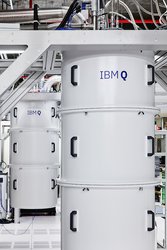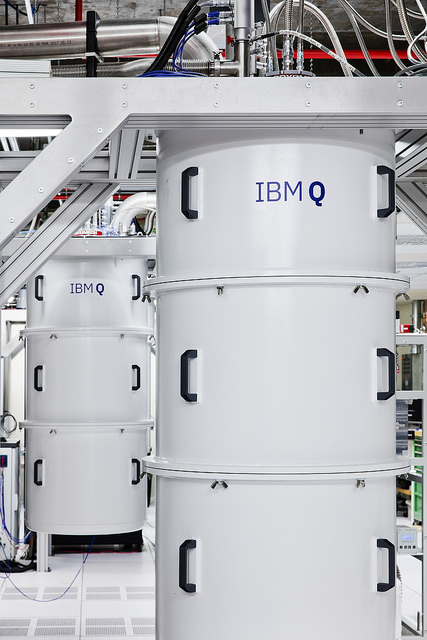
Dec. 15, 2017
By: Michael Feldman
Twelve organizations, which include top-flight companies like JPMorgan Chase, Daimler AG, and Samsung, have signed up as the first customers for the IBM Q Network, the company’s initial foray into commercial quantum computing.
 The business is the evolution of the IBM Q Experience, a publicly available platform for academic users and industry researchers. According to the company, over 60,000 users have run more than 1.7 million experiments on the platform’s quantum processors, via the Bluemix cloud. The advent of the Q Network represents IBM’s commercial entry in the market.
The business is the evolution of the IBM Q Experience, a publicly available platform for academic users and industry researchers. According to the company, over 60,000 users have run more than 1.7 million experiments on the platform’s quantum processors, via the Bluemix cloud. The advent of the Q Network represents IBM’s commercial entry in the market.
In addition to JPMorgan Chase, Daimler AG, and Samsung, the first customers include JSR Corporation, Barclays, Hitachi Metals, Honda, Nagase, Keio University, Oak Ridge National Lab, Oxford University, and University of Melbourne. All of them will be will be able to tap into IBM’s 20-qubit quantum computer, which the company installed in November. A 50-qubit system, which is currently just a prototype, will be offered to customers in a future version of the platform.
Each of the initial clients will use the opportunity to research and develop quantum computing applications related to their area of expertise. In the case of JP Morgan Chase, the company will focus on how the technology can be applied to financial services applications, including trading, portfolio optimization, asset pricing, and risk analysis. Daimler AG will use the Q Network to help develop new materials for battery cells through quantum chemistry, as well figure out optimal routes for vehicle fleets, including autonomous cars. Engineers at Samsung want to use the systems to investigate new materials for microelectronics and look at ways to improve manufacturing. Likewise, Barclays, Hitachi Metals, Honda and Nagase will use the platform to explore potential applications in their own domains – finance, materials, automotive and chemistry, respectively.
The non-profit clients – Keio University, Oak Ridge National Lab, Oxford University, and University of Melbourne – will serve as regional hubs to boost access to the Q Network. To do this, they will enable their research collaborators and partners to get access to Q's quantum computers. The idea here is to help build up the ecosystem around the platform and increase expertise around the technology.
In addition to starting the Q Network business, IBM is introducing a Q Consulting service. The service “brings together consultants, scientists and industry experts to help clients realize new business value through the application of quantum computing technology, and deliver customized roadmaps to help them become quantum ready.”
IBM is competing with Google, Intel, Microsoft, and others in bringing quantum computers to market. The 20-qubit experimental system that is currently available is not meant to provide a general-purpose capability for this technology. Most industry experts expect that systems will need hundreds of qubits to be broadly usable by industry and academia.
“IBM sees the next few years as the dawn of the commercial quantum era – a formative period when quantum computing technology and its early use cases develop rapidly,” said Dario Gil, vice president of AI and IBM Q, IBM Research. “The IBM Q Network will serve as a vehicle to make quantum computing more accessible to businesses and organizations through access to the most advanced IBM Q systems and quantum ecosystem,”
